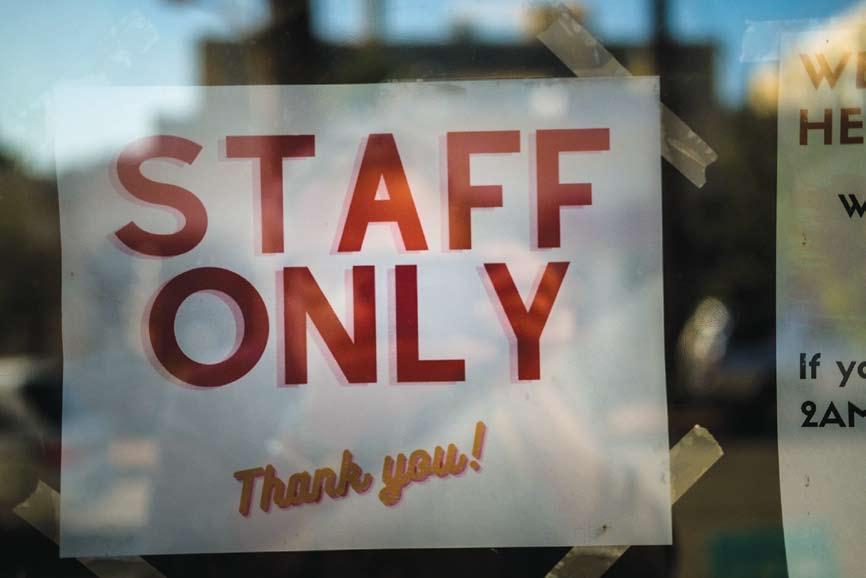
9 minute read
FOOD
Table for None
Several D.C. restaurants survived the pandemic without letting customers cross the threshold. Was only offering takeout the right decision?
Advertisement
By Laura Hayes
@LauraHayesDC Over the past year, restaurant owners have lamented being at the mercy of the weather. Surprise squalls and cold snaps thwarted customers’ outdoor dining plans and dollars, metaphorically speaking, slipped down storm drains. Other tortured proprietors had to expand or shrink their staff like an accordion as the city loosened and tightened indoor dining capacity. Still more said they had to cut the cord on the notion that the “customer is always right” when diners wouldn’t adhere to regulations set by the city.
But a small contingent of local restaurateurs positioned themselves to avoid these challenges by never letting customers cross the threshold of their restaurants. From day one of the pandemic, they’ve only offered takeout. Those who spoke with City Paper are unified in the primary driving force behind their choice—keeping employees as safe as possible. They also say that while they believe they charted the right course, they don’t fault others in the industry for taking different approaches. In a pandemic, there are only hard decisions.
“It was the right decision for us because none of our employees have had any problems,” says Sak Pollert. He’s owned RICE, a Thai restaurant on 14th Street NW, since 2003 and says he “sacrificed a lot economically” by losing out on dine-in income. Fortunately for him, his landlord was willing to work with him on reducing rent through a payment plan. “We are all still together as a family and safe and sound,” he says. “We hope that once this issue has passed we can recover financially, but if we lost anyone that’s impossible to recover from.”
“Out of the gate we listened to our staff,” echoes restaurateur Mike Friedman. He still hasn’t let anyone besides staff enter AllPurpose Pizzeria in Shaw or The Red Hen in Bloomingdale. The Capitol Riverfront location of All-Purpose has offered outdoor dining. “That’s the No. 1 thing that’s driven our approach to this—listening to the people that work with us,” he says. “The sentiment was, ‘We don’t feel comfortable bringing people in.’ One-hundred percent I made the right choice.”
Despite this approach, Friedman had to contend with a number of COVID-19 scares. “[Transmission] could have happened at home,” he says. “There’s a bit of an honor code. It’s hard to tell someone what to do when they’re not at the restaurants.” They were transparent about incidents on social media, sharing with the public that they would close until all employees received negative test results.
Having the dining room closed at AllPurpose Shaw eased the restaurant’s transition into an unpredictable but mostly thriving takeout operation. From March 2020 to March 2021, Friedman says his Shaw shop sold 65,000 pizzas. All of those pizza boxes and bottled to-go cocktails require a lot of square footage.
Friedman counts his blessings knowing that he’s always been “in the business of satisfaction and nostalgia”—two intangibles diners have craved throughout the pandemic. Spicy honey-drizzled pepperoni pizzas from All-Purpose and Red Hen’s sausage-studded mezze rigatoni are comforting eats and translate well to takeout. “That paid off,” he says. “But I didn’t build the concepts just in case there was a yearlong pandemic thinking that we’d be OK!”
Fellow pizzeria 2 Amys could also capitalize on selling one of the world’s most popular delivery items and a loyal following that predated the pandemic. Owner Peter Pastan was so committed to takeout that he set up a second pizza oven in the dining room to give his line cooks room to spread out.
“Things are stressful the way they are, but if I had to think about fighting with stupid customers who don’t follow the rules, that puts so much stress on me and my staff,” Pastan explains. “Looking at good weather and bad weather and constantly running around like a crazy person trying to adapt sounds like a nightmare scenario to me. Having made the decision I did, I felt a lot better. You can see a clearer path forward.”
Other restaurants never imagined they’d be selling food to-go, like Trinidadian restaurant Cane on H Street NE or Dupont Circle fine dining mainstay Komi. “The safety of our team has always been nonnegotiable,” says Anne Marler, Komi and Little Serow co-owner. “We’d make the same decision again, every time, without hesitation. It was a no-brainer for us. With carryout, we’re all on equal footing. We and our guests both wear masks in a show of mutual respect and shared experience. It represents that we’re all on the same page, doing our best to keep each other safe.”
But there’s no way to box up a two-hour Greek tasting menu experience from Chef Johnny Monis and his team, so Komi reopened as Happy Gyro, a more laid-back restaurant they ran as a successful pop up in the past. The menu stars a vegetarian yuba skin gyro as well as pizzas, walnut tacos, fun sides such as smoky mozzarella sticks, and ice creams like sourdough with persimmon and cocoa nib praline from sous chef Ben Brunner.
“It would be easy to think that this scrappy, casual operation we’ve devoted ourselves to for the last year is just a ‘plan b,’ or something less fulfilling than what we were doing before, but that isn’t really the case,” Marler continues. “We’re unbelievably proud of the product we’re putting out and have found a lot of joy tapping into long-simmering creative pursuits.” She says her husband’s pizzas and Brunner’s ice creams would be the best things to come out of 2020, “plague or not.”
Cane is about the same size as Komi, which takes up the single floor of a converted row house. “When considering the risks and rewards, we thought it didn’t make sense to
Darrow Montgomery/File
expose the staff,” says Cane’s chef and owner Peter Prime. “We only had 33 seats inside and limited opportunities for outdoor seating. This year has been about surviving. Everyone came through healthy so far.”
He was just starting to consider offering a few items for takeout and delivery when the pandemic hit. “I originally thought of Cane as the complete experience,” Prime says. “I was pleasantly surprised when there was demand for Cane food apart from the experience at home.” Still, he misses the instant gratification of seeing people enjoy his food. When food is divorced from the dining experience, chefs can feel like they’re just going through the motions.
“We used to have fun with the presentation,” says Pollert from RICE. “We’d garnish dishes with microgreens and make food for the eyes as much as for the stomach.” Now they nestle drunken noodles and stir-fried spicy duck into cardboard containers. “We became more like a factory to produce food. There’s no pride or joy because it’s ending up in a box. We don’t see the appreciation or satisfaction that we used to see at the table. We’re grateful that we still have a job, but there’s no joy.”
Friedman, meanwhile, says he rethought his role as a restaurateur. “My job changed in the sense that I was now in charge of the three Cs: Culture, Content, and Creativity,” he says. “I do not have restaurants anymore. They don’t exist in the normal sense. I have websites now. How do I drive exposure to those websites?” At Red Hen, Friedman has run special menus celebrating different regions of Italy to keep the menu fresh and assuage boredom for both customers and staff.
While you don’t get to banter with your regular server or see “Happy Anniversary” scrawled in chocolate sauce on dessert plates, some restaurants have found ways to box up hospitality. Memorable takeout meals have come with suggested playlists, handwritten notes, or bottled hand soap that would normally be dispensed on site in the restroom.
“It’s counterintuitive, but translating our skill set for people to take into their homes is surprisingly intimate,” Marler says. “Instead of pairing wines with specific dishes, our wine director Kyle Wilson is pairing wines with
entire life events. He’s always been so good at weaving a narrative around wine, but now it’s happening in an almost literal way.” A couple wanted the Happy Gyro team to set them up with a series of meals and wines for their anniversary weekend, for example. The restaurant obliged. “It’s been pretty special that people can let us into their lives to that extent,” Marler says.
Now that D.C. restaurant workers are eligible for the COVID-19 vaccine, and more Washingtonians seem to be venturing out to eat after being vaccinated, restaurants are weighing when they’ll feel comfortable inviting diners to sit down for meals again.
“We cannot wait to bring people back into the restaurant,” Friedman says. “Just the sounds of restaurants we miss—the clinking of glasses, the laughter, the shaking of a cocktail. We even miss the dropping of plates during a busy service.” But he’s not looking to make any changes until the majority of his employees at all locations are vaccinated and the city increases the indoor dining seating capacity beyond 25 percent. For Prime, that percentage needs to be over 50 percent.
Marler goes even further. “We don’t see a return to in-person dining while masks are still a necessary part of our life,” she says. “Our faces, and the faces of our guests, are a huge part of the hyper-personal style of service that we’ve taken so much care to cultivate. The interpersonal alchemy is what elevates a meal above the sum of its parts. … We don’t know what the future will hold, but it’s hard to envision a future that looks exactly like how things used to look—and I don’t think that’s a bad thing.”

WE’LL ALWAYS STRIVE TO BE YOUR ADVOCATE. DAY IN, DAY OUT.
Every day can bring changes, challenges and opportunities. Some are big, others small, but all of them can also alter your personal or business financial goals and priorities. What can make it all easier is a true financial partner. Someone who really listens, understands and then creates solutions with you, from managing your personal finances to running your business. That’s real banking for real life. And real business.
Call 833.987.REAL or visit sandyspringbank.com/real.
P E R S O N A L | B U S I N E S S | W E A L T H | I N S U R A N C E | M O R T G A G E
Member FDIC. Equal Housing Lender. Sandy Spring Bank NMLS # 406382. Wealth and Insurance products are not FDIC insured, not guaranteed, and may lose value. Sandy Spring Bank and the SSB logo are registered trademarks of Sandy Spring Bank. Real banking for real life.SM © 2021 Sandy Spring Bank. All rights reserved.







